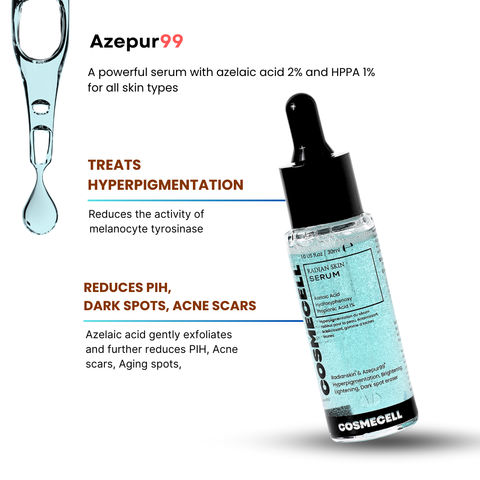The Rise of Organic Skincare: A Natural Revolution
In a world inundated with synthetic formulations and chemical-laden products, organic skincare has emerged as a beacon of natural wellness, offering a harmonious blend of efficacy and environmental consciousness. This burgeoning movement isn't merely a fleeting trend but represents a profound shift in how we perceive skincare—transforming it from a superficial routine into a holistic ritual that honors both our dermal health and planetary wellbeing.
The essence of organic skincare lies in its commitment to purity: ingredients cultivated without pesticides, preservatives, or synthetic fertilizers. These formulations harness the unadulterated power of nature, delivering nutrients in their most bioavailable form. For both men and women seeking authenticity in their self-care regimens, organic options provide not just external beauty benefits but a congruence with internal wellness philosophies.
Studies increasingly corroborate what traditional wisdom has long suggested—that naturally derived ingredients often possess superior biocompatibility with human skin. This intrinsic affinity allows for enhanced absorption and utilization, enabling deeper cellular regeneration and repair processes that artificial alternatives simply cannot replicate.
Understanding the Organic Certification Process
Navigating the labyrinth of organic certifications requires discernment. Legitimate organic skincare products undergo rigorous scrutiny by regulatory bodies such as USDA, COSMOS, or EcoCert. These certifications ensure adherence to strict cultivation and formulation standards, verifying that products contain ingredients grown without synthetic pesticides, genetically modified organisms, or irradiation techniques.
The certification process examines every facet of production—from soil quality and water conservation practices to biodiversity preservation and ethical harvesting methodologies. This comprehensive evaluation guarantees that when you select certified organic skincare, you're investing in products whose journey from seed to bottle harmonizes with ecological principles.
The Science Behind Organic Ingredients' Efficacy
Contrary to skeptical perspectives, organic skincare isn't merely a romanticized return to tradition—it's substantiated by contemporary dermatological research. Phytochemicals, the bioactive compounds naturally occurring in plants, demonstrate remarkable cutaneous benefits that synthetic alternatives often attempt to replicate, albeit with varying degrees of success.
For instance, organic rosehip oil contains trans-retinoic acid, a natural precursor to vitamin A that promotes cellular turnover without the irritation commonly associated with synthetic retinoids. Similarly, organic green tea extracts deliver polyphenols—particularly epigallocatechin gallate (EGCG)—that provide antioxidant protection against free radical damage while simultaneously reducing inflammation through multiple biochemical pathways.
Bioavailability and Skin Penetration
The exceptional efficacy of organic ingredients often stems from their superior bioavailability—the degree to which active compounds can be absorbed and utilized by skin cells. Organic cultivation methods preserve delicate molecular structures that might otherwise be compromised by harsh chemical treatments.
Furthermore, whole-plant extracts typically contain synergistic compounds that enhance absorption and efficacy. This phenomenon, known as the "entourage effect," explains why isolated synthetic ingredients frequently fail to deliver the comprehensive benefits of their organic counterparts—despite appearing identical on paper.
"Nature compounds brilliance in simplicity. Organic skincare doesn't attempt to improve upon perfection; it simply preserves the integrity of what already exists in its most optimal form." - Dr. Sarah Gottfried, Dermatological Researcher
Key Ingredients in Organic Skincare Formulations
The botanical pharmacy of organic skincare offers a panoply of potent ingredients, each with unique dermatological benefits suited for diverse skin concerns. Understanding these natural powerhouses empowers informed selection aligned with individual skincare goals.
Plant Oils and Butters: Nature's Moisturizers
Organic plant oils and butters represent nature's most sophisticated hydration solutions, offering molecular structures remarkably compatible with human sebum. Jojoba oil, with its unique composition of eicosenoic acid, mimics our skin's natural oils so precisely that it can actually recalibrate sebum production—beneficial for both dry and oily skin types.
Shea butter, extracted from nuts of the Vitellaria paradoxa tree, contains unsaponifiable compounds that not only hydrate but actively repair damaged skin barriers. Its high concentration of stearic and oleic acids creates an emollient matrix that preserves cutaneous moisture while allowing skin to breathe—a feat many synthetic occlusives fail to achieve.
Botanical Extracts: Targeted Solutions
The phytochemical profiles of organic botanical extracts offer specificity comparable to synthetic actives, but with broader collateral benefits. Calendula extract, harvested from organically grown marigold flowers, contains triterpenoid saponins that simultaneously address inflammation, bacterial colonization, and wound healing—a true multitasking ingredient for sensitive or compromised skin.
Chamomile extract, particularly from the German variety (Matricaria recutita), delivers apigenin and bisabolol, compounds with demonstrable effects on inflammatory cytokine cascades—making it particularly efficacious for conditions like rosacea and eczema without the thinning effects associated with topical corticosteroids.
| Organic Ingredient | Primary Benefit | Ideal For |
|---|---|---|
| Rosehip Seed Oil | Natural Retinol Alternative | Anti-aging, Hyperpigmentation |
| Sea Buckthorn Oil | Exceptional Healing Properties | Damaged Skin Barriers, Eczema |
| Aloe Vera | Deep Hydration, Soothing | Post-Sun Exposure, Irritation |
| Manuka Honey | Antimicrobial, Humectant | Acne, Dehydration |
Creating Your Organic Skincare Routine
Transitioning to organic skincare requires more than simply substituting products; it invites a holistic reassessment of your skin's needs and environmental rhythms. An effective organic regimen acknowledges skin as a dynamic organ constantly responding to internal and external influences—not merely a canvas requiring cosmetic manipulation.
Morning Ritual: Protection and Preparation
Morning organic skincare focuses on fortifying skin against daytime stressors. Begin with a gentle cleanser containing ingredients like organic coconut glycerin or saponified oils that cleanse without disrupting your skin's acid mantle—preserving its intrinsic defensive capabilities.
Follow with an antioxidant-rich serum featuring organic ingredients such as pomegranate extract or astaxanthin from microalgae, providing prophylactic protection against oxidative damage from pollution and UV exposure. Conclude with mineral-based sun protection, preferably containing non-nano zinc oxide for broad-spectrum defense without endocrine-disrupting chemicals.
Evening Protocol: Regeneration and Repair
Evening routines leverage your skin's natural nocturnal regeneration cycle. Begin with oil cleansing using organic base oils like hemp or macadamia, which dissolve accumulated sebum and environmental residue while preserving beneficial flora on your skin's surface.
Incorporate organic exfoliants such as enzymatic papaya extract or gentle fruit acids derived from organic bilberries or sugar cane to facilitate cellular turnover without microabrasions. Complete with deeply nourishing botanicals like organic prickly pear seed oil or blue tansy essential oil, which support dermal repair processes during sleep with their concentrated bioactive constituents.
DIY Organic Skincare: From Kitchen to Vanity
The apothecary of your kitchen often houses potent organic skincare ingredients awaiting transformation into bespoke formulations. Creating personalized concoctions not only ensures absolute ingredient transparency but fosters a deeper connection with nature's pharmacy.
When crafting homemade organic skincare, fresh preparation ensures maximum potency of volatile compounds that might otherwise deteriorate. Additionally, raw ingredients allow precise customization for your skin's idiosyncratic needs—addressing concerns from hyperpigmentation to dehydration with targeted botanical solutions.
Simple Yet Effective Recipes
Begin your DIY journey with uncomplicated formulations that deliver immediate results. A simple mask combining organic raw honey (with its natural hydrogen peroxide content) and fresh yogurt (containing lactic acid) creates a gentle exfoliating treatment that simultaneously nourishes and brightens—suitable for even sensitive complexions.
- For dry skin, blend 1 tablespoon organic avocado oil with 3 drops frankincense essential oil for a penetrating night treatment that fortifies barrier function
- Address blemish-prone skin with a clarifying toner combining organic witch hazel, tea tree essential oil, and aloe vera juice
- Create an enzymatic exfoliant by mashing organic pineapple with coconut milk for a tropical treatment that dissolves dead cells without abrasion
Frequently Asked Questions About Organic Skincare
As organic skincare continues gaining prominence, certain questions consistently arise from those considering the transition. Addressing these common inquiries provides clarity and confidence for newcomers to natural formulations.
Is Organic Skincare Suitable for All Skin Types?
Organic skincare's diversity accommodates virtually all skin types, though formulation matters significantly. Those with sensitive skin often find relief in organic products free from synthetic fragrances and preservatives that frequently trigger reactions. Conversely, acne-prone individuals benefit from non-comedogenic organic oils like hemp seed and grapeseed, which balance sebum production without clogging pores.
Even conditions like psoriasis and eczema may respond favorably to organic ingredients such as calendula and evening primrose oil, which address inflammation through pathways different from conventional medications—sometimes providing complementary benefits when used alongside prescribed treatments.
How Long Before Seeing Results with Organic Products?
The timeline for visible results with organic skincare varies based on both the specific concern being addressed and your skin's intrinsic renewal cycle. Generally, hydration improvements manifest within days, while concerns like hyperpigmentation require consistent application over weeks or months—reflecting the natural pace of cellular processes rather than a limitation of organic ingredients.
Patience becomes particularly important when transitioning from conventional products containing immediate but temporary effect ingredients like silicones. Your skin may undergo an adjustment period as it recalibrates its own regulatory mechanisms—a process that ultimately yields more sustainable results aligned with your skin's natural equilibrium.
Embrace the journey toward organic skincare as an investment in both immediate radiance and long-term cutaneous health. By honoring your skin's intrinsic wisdom and supporting it with nature's purest offerings, you cultivate not just external luminosity but holistic wellbeing that radiates from within—a truly sustainable approach to beauty that harmonizes with both personal and planetary health.



